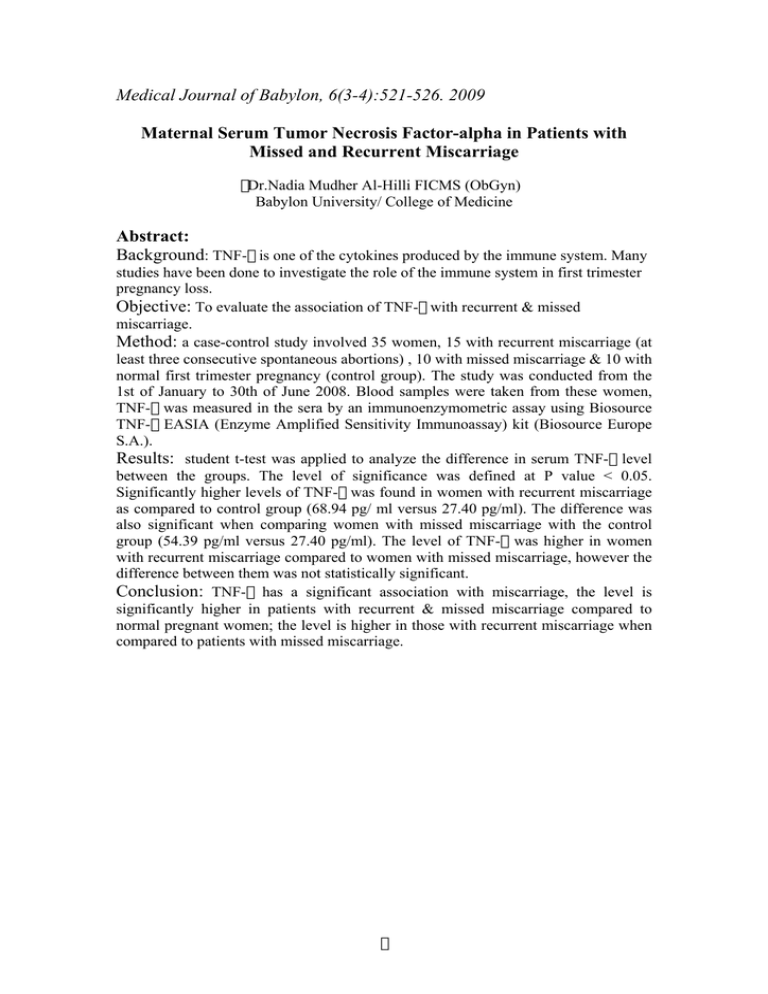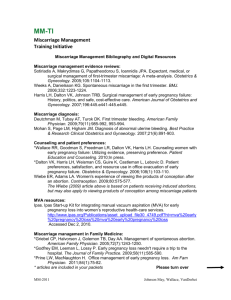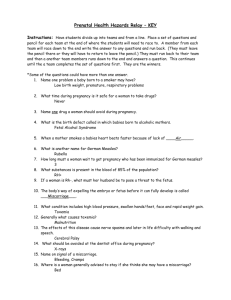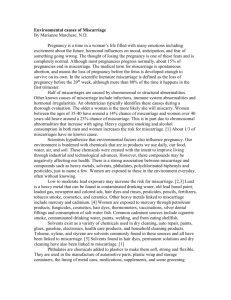Medical Journal of Babylon, 6(3-4):521-526. 2009 Missed and Recurrent Miscarriage
advertisement

Medical Journal of Babylon, 6(3-4):521-526. 2009 Maternal Serum Tumor Necrosis Factor-alpha in Patients with Missed and Recurrent Miscarriage Dr.Nadia Mudher Al-Hilli FICMS (ObGyn) Babylon University/ College of Medicine Abstract: Background: TNF- is one of the cytokines produced by the immune system. Many studies have been done to investigate the role of the immune system in first trimester pregnancy loss. Objective: To evaluate the association of TNF- with recurrent & missed miscarriage. Method: a case-control study involved 35 women, 15 with recurrent miscarriage (at least three consecutive spontaneous abortions) , 10 with missed miscarriage & 10 with normal first trimester pregnancy (control group). The study was conducted from the 1st of January to 30th of June 2008. Blood samples were taken from these women, TNF- was measured in the sera by an immunoenzymometric assay using Biosource TNF- EASIA (Enzyme Amplified Sensitivity Immunoassay) kit (Biosource Europe S.A.). Results: student t-test was applied to analyze the difference in serum TNF- level between the groups. The level of significance was defined at P value < 0.05. Significantly higher levels of TNF- was found in women with recurrent miscarriage as compared to control group (68.94 pg/ ml versus 27.40 pg/ml). The difference was also significant when comparing women with missed miscarriage with the control group (54.39 pg/ml versus 27.40 pg/ml). The level of TNF- was higher in women with recurrent miscarriage compared to women with missed miscarriage, however the difference between them was not statistically significant. Conclusion: TNF- has a significant association with miscarriage, the level is significantly higher in patients with recurrent & missed miscarriage compared to normal pregnant women; the level is higher in those with recurrent miscarriage when compared to patients with missed miscarriage. Introduction: Miscarriage implies spontaneous loss of pregnancy before viability. Miscarriage replaces the term abortion as usually the later refers to elective termination of pregnancy. Viability implies the ability of the fetus to survive extra-uterine life. This is generally considered to occur at approximately 24 weeks gestation. Rarely, fetuses born before that gestation survive for short time or at least show some signs of life. The World Health organization also included in this definition the fetus's weight < 500 g (1). Miscarriages are very common. Approximately 15 % of pregnancies end in miscarriage. However, it is likely that far more pregnancies are lost before they are suspected, recognized or confirmed (2). There are different types of miscarriages, these include: • Threatened: painless bleeding from the uterus before 24 weeks with the cervix not dilated & the fetus alive. • Inevitable: bleeding from the uterus before 24 weeks with pain & dilatation of the cervix. • Incomplete: part of the conceptus has been expelled with continuous bleeding due to tissue retained. • Complete: the whole conceptus has been expelled. • Missed: pregnancy failure (gestational sac containing dead embryo or fetus before 24 weeks) is identified before expulsion of fetal & placental tissue. • Recurrent: three or more consecutive miscarriages (3). Aetiology: Many factors have been implied in the causation of miscarriage. These include: • Chromosomal abnormalities: trisomies, triploidy & monosomies. • Endocrine disorders: diabetes, thyroid disease, luteal phase deficiency, polycystic ovary syndrome. • Abnormalities of the uterus: uterine anomalies, endometrial adhesions & cervical incompetence. • Infections: Salmonella typhi, malaria, cytomegalovirus, toxoplasmosis & others. • Chemical agents: tobacco, anaesthetic gases, pesticides & others. • Immunological disorders: antiphospholipid syndrome. • Thrombophilia (hereditary) (4). Between 1 & 2% of fertile women will experience recurrent miscarriage. As the majority of recurrent miscarriage cases following investigations are classified as idiopathic, it is generally accepted that within the idiopathic group there is considerable heterogeneity and it is unlikely that one single pathological mechanism can be attributed to their recurrent miscarriage history. Current research is directed at theories related to implantation, trophoblast invasion and placentation (5). Immunity plays an important role at the time of implantation. Many studies in animals & human indicate that some degree of systemic & uterine inflammation is necessary both for normal implantation & pregnancy. However, if the inflammation becomes too excessive it might cause pregnancy complications such as fetal resorption / miscarriage. The main regulator of the correct level of inflammation at the fetomaternal interface seems to be the uterine CD16 & CD56 bright natural killer cells. Trophoblast debris, apoptotic cells & progesterone probably regulate the production of inflammatory cytokines from these cells. Miscarriage of karyotypically normal embryos may occur when the level of inflammation falls outside the optimal range, this may be associated with high tumor necrosis factor (TNF)- production (6). TNF- was first identified as a cytokine secreted by endotoxin-activated macrophages that induced the necrosis of tumours. TNF- is now known as a pluripotent cell mediator and angiogenic cytokine that promotes the production of other cytokines in various cells. The human endometrium is characterized by a variety of cell types, including fibroblasts, immune cells, vascular cells and epithelial cells, all of which express TNF- . Studies suggest a local role for TNF- in a variety of normal endometrial functions. Increased expression of this cytokine was shown to cause pathophysiological effects reflected by its involvement in implantation failure, abortion and endometriosis (7). Another mechanism through which TNF- may participate in the process of miscarriage is that together with other cytokines like interferon gamma (INF- ) they initiate apoptosis of the corpus luteum which is responsible for the maintenance of pregnancy via the production of progesterone that is required for the establishment of suitable uterine environment during early pregnancy. Inappropriate luteal function (luteal insufficiency) may contribute to the high incidence of spontaneous abortion (8). Aim of study: To evaluate TNF- production in women with recurrent pregnancy loss & compare it with those with missed miscarriage & normal pregnant women. Patients & methods: The study was conducted in Babylon Teaching Hospital for Gynecology & Pediatrics from the first of January 2008 to 30th of June 2008. The study included 35 women who attended emergency department, out patient clinic or admitted to gynecology ward. 25 women had experienced recent miscarriage, 15 had recurrent miscarriage & 10 had missed miscarriage. Ten women with normal first trimester pregnancy were taken as control group. Women were submitted to a questionnaire including, age, gravidity & parity, number of miscarriages, gestational age, medical illnesses, drug history,& investigations done for the cause of miscarriage. Exclusion criteria were: • Identified causes of miscarriage, e.g. infection or medical disease of the mother. • Conditions associated with increased TNF- level, e.g. hyperemesis gravidarum. Blood samples were collected from women under study, sera isolated & TNF- was measured by immunoenzymometric assay using Biosource TNF- EASIA kit (Biosource Europe S.A.) which is a solid phase Enzyme Amplified sensitivity Immunoassay (EASIA) performed on a microtiter plate. TNF- level was measured in picogrram / ml. The Kit providers recommend that each laboratory establishes its own normal values. Statistical Analysis: For statistical analysis SPSS (version 10) program was used. The results were represented through frequency, mean & standard deviation. Student t-test used to compare between means & study the significance of the difference. P value <0.05 was considered to be statistically significant. Results: Table (1) show a comparison between patients with recurrent miscarriage & control group regarding the level of TNF- in maternal serum, the level was higher in those with recurrent miscarriage (68.94 versus 27.40 pg/ml) & by using student t test we found that the difference was highly significant (P value < 0.05). Table no.1 show the difference in maternal serum TNF- level in patients with recurrent miscarriage compared to normal pregnants. No. TNF- level SD(±) Standard error df t P value (pg/ml) of the mean Recurrent 15 68.94 13.54 4.28 23 miscarriage 7.22 0.0005 control 10 27.40 26.43 8.36 19 Table (2) compares patients with missed miscarriage with the control group regarding maternal serum TNF- level, the level was higher in patients with missed miscarriage ( 54.39 versus 27.40 pg/ml ), this difference was statistically significant ( P value < 0.05). Table (2) show the difference in maternal serum TNF- level in patients with missed miscarriage compared to normal pregnants. No. Mean TNFSD(±) Standard error df t P value level (pg/ml) of the mean Missed 10 54.39 39.69 12.35 19 miscarriage 2.62 0.02 control 10 27.40 26.43 8.36 19 In table (3) we compare maternal serum TNF- level in patients with recurrent & missed miscarriages. The level was higher in patients with recurrent miscarriage (68.94 versus 54.39 pg/ml). However this difference between the two groups was not statistically significant (P value > 0.05). Table (3) shows the difference in maternal serum TNF- level between patients with recurrent & missed miscarriages. patients No. Mean TNFSD(±) Standard level (pg/ml) error of the df t P value mean Recurrent 15 68.94 13.54 4.28 23 miscarriage 1.36 0.9 Missed 10 54.39 39.69 12.55 19 miscarriage Discussion: Cytokines seem to play a critical role in the pathogenesis of unexplained recurrent pregnancy loss. In our study we evaluate the level of TNF- in serum of women with recurrent miscarriage & patients with missed abortion as these women may also have the same pathophysiology when they experience further pregnancy losses & go on to have recurrent miscarriage. In our study we compare patients with recurrent miscarriage with normal pregnant women in the first trimester & we found a highly significant difference in maternal serum TNF- level between the two groups (68.94 versus 27.40pg/ml) in recurrent miscarriage & control group respectively. Similar results were obtained in a study done by Daher S. et.al, who measure the level of a number of cytokines (TNF- , interferon- , interleukin-6 & others) in women with recurrent pregnancy loss & compare them with control group (women with history of successful pregnancies). They found that IFN- & TNF- were significantly higher in women with recurrent pregnancy loss compared to control, while no significant difference was found in maternal serum level of IL-6 (9). Another study done by Kim H.R. et.al. who investigated immunophenotypic characteristics of peripheral blood mononuclear cells & evaluate Th1 cytokine (TNF) production in women with recurrent spontaneous abortions. They observed a significantly higher level of TNF- in recurrent spontaneous abortion when compared to controls (10). Regarding patients with missed miscarriage, we find a significant difference in maternal serum TNF- level when comparing them to control group. A similar results obtained by Paradisi R. et. al., who studied the proinflammatory cytokines in women with threatened & missed miscarriage & compared them to normal non-pregnant women, he found a significantly higher levels of these cytokines in women with missed miscarriage, while no significant difference was found in women with threatened miscarriage when compare them to control group (11). This mean that a similar mechanism may exist in the pathophysiology of recurrent & missed miscarriage and to study the two groups together we compare the maternal serum TNF- level in patient with recurrent & missed miscarriage, the level was higher in patients with recurrent miscarriage though the difference was not statistically significant. This may be explained by the possibility that women with one or two missed miscarriages may have a derangement in her immune system that is not so great as in those with recurrent miscarriage or that it is not the same mechanism act each time as she may have successful pregnancies Conclusions: 1. There is an association between elevated maternal serum TNF- level & early pregnancy loss. 2. The difference is highly significant when we compare patients with recurrent miscarriage with normal pregnant ladies in the first trimester. 3. A significant difference is found in maternal serum TNF- level when we compare patients with missed miscarriage to normal pregnant women in the first trimester. 4. A difference is found in maternal serum TNF- level when we compare patients with recurrent miscarriage to those with missed miscarriage. Recommendations: 1. Maternal serum TNF- level should be considered as one of the investigations done to women with recurrent miscarriage. 2. Further studies are needed to identify the exact mechanism through which TNF- is involved in the pathophysiology of pregnancy loss. 3. Studies are needed to evaluate the association of other inflammatory mediators in the process of miscarriage. 4. Inhibitory factors for TNF- may be used as a therapeutic agent in women with recurrent miscarriage who have elevated serum TNF- level. References: 1. Cabill D. J, Wardle P. G. Bleeding and Pain in Early Pregnancy. High Risk Pregnancy Management Options. Saunders Elsevier 3rd edition 2005. Chapter 4, P 84-104 2. Wilcox A. J. Incidence of early loss of pregnancy. New England Journal of Medicine. Volume 319, number 4, July 1988, P 189-194. 3. Grudzinskas J. D, Miscarriage, ectopic pregnancy & trophoblastic disease. Dewhurst's Textbook of Obstetrics & Gynaecology for Postgraduates. Blackwell Science 6th edition 1999. Chapter 7, p61-75. 4. Monga A. Disorders of Early Pregnancy. Gnaecology by Ten Teachers. Hodder Arnold 18th edition 2006. Chapter 8, P 89-102. 5. Raj Rai. Recurrent miscarriage. Dewhurst's Textbook of Obstetrics & Gynaecology for Postgraduates. Blackwell Science 7th edition 2007. Chapter 13, page 100-105. 6. Christiansen O., Nielsen H. Inflammation & miscarriage. Seminars in Fetal & Neonatal Medicine. 2003. volume 11, Issue 5, P 302-305. 7. Morin M, Sengers V, Tumour necrosis factor- up-regulates macrophage migration inhibitory factor expression in endometrial stromal cells via the nuclear transcription factor NF- B. Oxford Journals, Human Reproduction, 2006, Volume 21, Number 2, Pp. 421-428. 8. Pru J. K, Lynch M.P. Signaling mechanism in tumor necrosis factor alphainduced death of microvascular endothelial cells of the corpus luteum. Repro Biol Endocrinol. Journal. 2003; 1:17. 9. Daher S, Camano L, Cytokines in recurrent pregnancy loss. Journal of Reproductive Immunology. 2004 June; 62(1-2): 151-7. 10. Kim HR, Park AJ, Lee MK. CD56/CD16 expression on mononuclear cells and concentration of serum TNF-alpha in recurrent spontaneous abortion. Korean J Lab Med. 2006 Jun; 26(3): 198-203. 11. Paradisi R. , Porcu E. Maternal Serum Levels of Pro- Inflammatory Cytokines in Missed and Threatened Abortion. Maternal Journal of Reproductive Immunology. January 2003. Volume 50, Issue 4, Pages 302 – 308.








